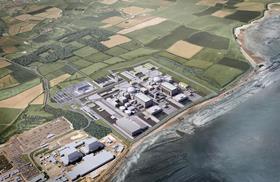European Commission’s initial report questions whether deal between EDF and government addresses genuine market failure
The £16bn Hinkley nuclear project has been dealt a blow after the European Commission published a scathing report on the deal the government agreed with the plant’s developer EDF.
The European Commission (EC) is investigating whether the deal, agreed between the government and EDF last year, contravenes EU state aid rules and today published its initial assessment, which questioned whether the government’s intervention addressed a genuine market failure and suggested the terms agreed under the deal will overpay EDF and shield it from most of the operational risk.
The deal, called a “contract for difference”, was agreed last October and guarantees that EDF will be paid £92.60/MWh for the electricity from the plant for 35 years, which is roughly twice the current wholesale price of power.
The EC estimates
In its report today, the EC said given EDF’s maximum expected capital cost the project would be profitable without a revenue guarantee from the government and that the whole contract for difference system risked “crowding out” investment in renewable energy projects.
The EC also questioned the price of the project, which was raised from £10bn to £16bn at the same time that the deal with the government was announced.
It said the cost was “reasonable”, according to studies commissioned by the government, but that it was “towards the upper end of the cost range”.
The papers also showed that EDF and its partners are set to make a return of between 9.75 and 10.25% on their investment in building the plant.
It said: “The Commission doubts that the level of profit used to set the strike price corresponds to the rate of return of a typical company considering whether or not to provide the service for the whole duration of the period of entrustment, taking into account the level of risk.”
The government has also said it will use the UK Guarantees scheme to underwrite much of the construction risk of the project, but the EC argued that offering both the guarantee and the contract for difference was unnecessary.
It said: “The Commission questions the need to provide a credit guarantee together with an instrument providing revenue assurance.
“There are grounds to believe that, once any potential market failure in financing the project is removed through the provision of a credit guarantee, the need for revenue assurance is indeed limited.”
Sticking to the long-standing government reasoning for the support for the project, energy minister Michael Fallon said today the project would “cut carbon in Britain’s energy sector and improve our energy security in a way that’s good value for money”.
But the EC papers said it was “difficult to argue” that the plant will “help UK achieve security of supply…given that the plant will not be operational before 2023”.
It added: “It is in particular unclear, based on the information provided, whether the more rapid fall in carbon emissions due to the contract for difference for nuclear energy can be construed as being aimed at decarbonisation in a context where the ‘business as usual’ scenario would lead to a similar carbon emission trajectory path.”
In a statement, EDF said it would “co-operate fully” with the EC on its investigation.
It added: “It is right that the Commission should investigate the far-reaching market reform which makes this and future contracts possible.”
Hinkley construction milestones tied to ‘strike price’ deal
EDF’s deal with the government for the price of the electricity from its £16bn Hinkley Point nuclear plant could fall through if contractors fail to hit key milestones in the plant’s construction, documents published today reveal.
The clause, which forms part of EDF’s draft contract with the government, is likely to see contractors put under intense pressure to hit deadlines throughout the plant’s construction as the whole project’s viability hangs on carefully negotiated deal over the energy price.
In papers outlining the details of its investigation, published today, the EC said: “If certain milestones in the construction of the plant are not met by certain dates, NNB Generation Company [EDF and its partner’s development subsidiary] risks losing the contract for difference.”
It also revealed that if completion of the plant was late by a set number of years the 35 year timescale for the deal would be shortened.
How late the plant would have to be before this clause came into effect was redacted from the documents.

























No comments yet